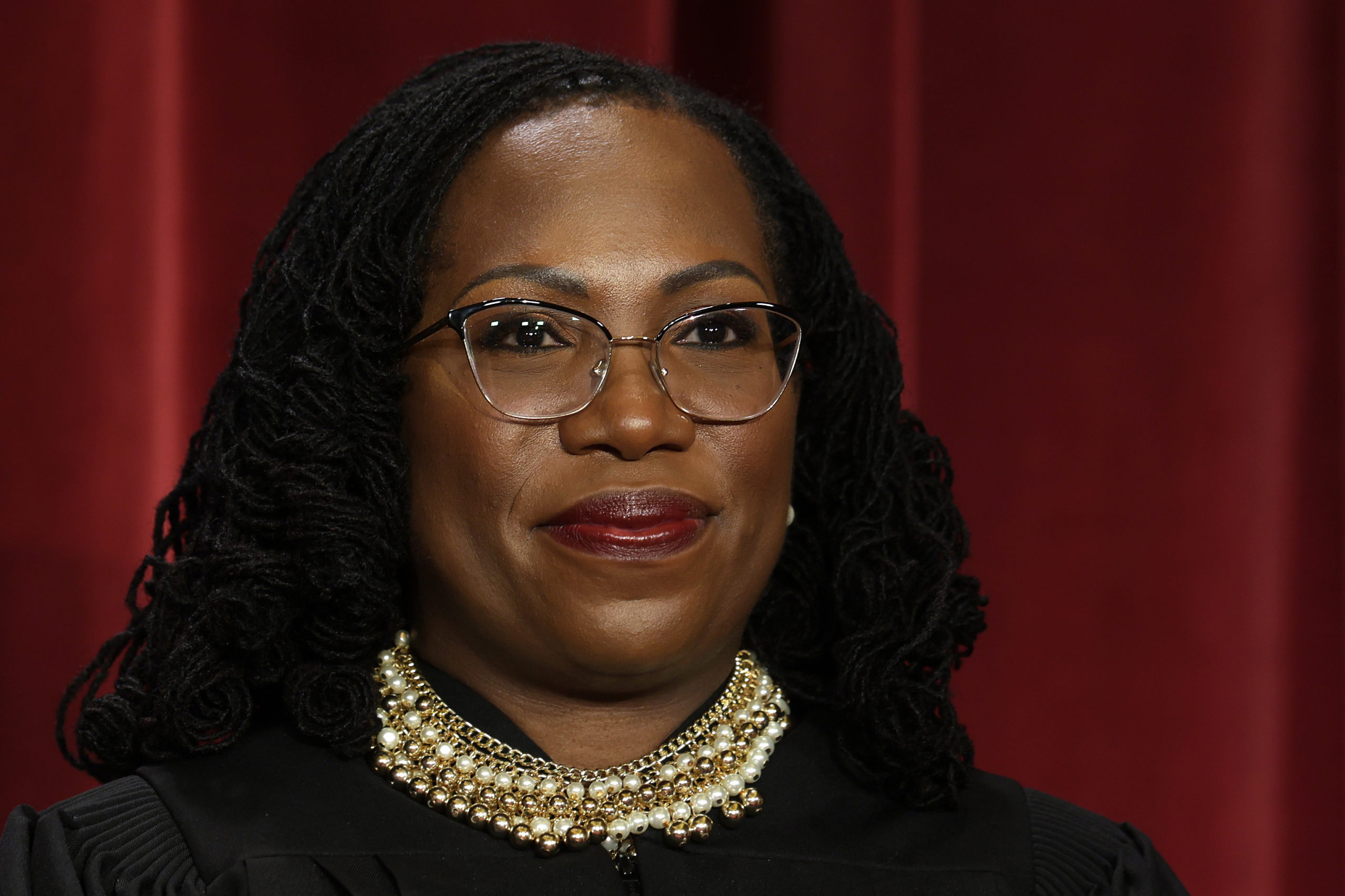Supreme Court Justice Kentanji Brown Jackson voiced concerns during oral arguments Monday in a case involving social media censorship that taking too broad a view of the First Amendment could mean “hamstringing the government.”
The Republican attorneys general of Louisiana and Missouri filed suit in May 2022 against President Joe Biden and various administration officials and agencies alleging they were using the federal government’s power to suppress free speech on social media platforms during the 2020 election and the COVID-19 pandemic.
In July 2023, U.S. District Court Judge Terry Doughty issued a preliminary injunction in the Murthy v. Missouri case barring administration officials from contacting social media companies in order to have content removed.
In September, the U.S. 5th Circuit Court of Appeals upheld the district court’s ruling in large measure, specifically as it relates to the Biden White House, the surgeon general, the Centers for Disease Control and Prevention and the FBI, NPR reported.
In oral arguments Monday, Jackson, in a back-and-forth with Louisiana Solicitor General Benjamin Aguiñaga, said, “There may be circumstances in which the government could prohibit certain speech on the internet or otherwise.”
“Do you disagree that we would have to apply strict scrutiny and determine whether or not there is a compelling interest in how the government has tailored its regulation?” the justice asked.
Kentaji Brown Jackson grills LA solicitor general, says that because the govt can occasionally censor, they can also occasionally coerce:
KBJ: “Whether or not the government can do this… depends on the application of our First Amendment jurisprudence.
There may be… pic.twitter.com/LmoL7bZDQY
— System Update (@SystemUpdate_) March 18, 2024
Aguiñaga responded, “Certainly your honor, at the end of every First Amendment analysis, you’ll have the strict scrutiny framework.”
The Supreme Court has previously ruled when reviewing government action in relation to a fundamental right such as free speech, the conduct must pass a strict scrutiny test.
The standard requires the government to show that it has a compelling interest and that the action being taken is using the least restrictive means to impact free speech.
“So not every situation in which the government engages in conduct that ultimately has some effect on free speech necessarily becomes a First Amendment violation, correct?” Jackson queried.
Aguiñaga conceded that was true, but in this case the federal government set out to censor free speech.
“My biggest concern is that your view has the First Amendment hamstringing the government in significant ways in the most important time periods,” Jackson said.
“Some might say that the government actually has a duty to take steps to protect the citizens of this country,” she continued.
“You seem to be suggesting that that duty cannot manifest itself in the government encouraging or even pressuring platforms to take down harmful information,” Jackson said. “In an environment of threatening circumstances, from the government’s perspective, and you’re saying the government can’t interact with the source of those problems.”
Justice Jackson: “My biggest concern is that your view has the First Amendment hamstringing the government in significant ways in the most important time periods.” pic.twitter.com/Ix6g7ptU6v
Are Jackson's views dangerous?— Jeremy Art (@cspanJeremy) March 18, 2024
Aguiñaga replied, “Our position is not that the government can’t interact with the platforms there. They can, and they should in certain circumstances like that, that present such dangerous issues for society and especially young people.”
“But the way they do that has to be in compliance with the First Amendment. And I think that means they can give them all the true information that the platform needs and ask to amplify that,” the solicitor general said.
On Monday, conservative Justice Samuel Alito asserted during oral argument, “The government is treating [social media platforms] like their subordinates.”
Justice Alito: “The government is treating social media platforms like their subordinates.”
You CANNOT outsource censorship and call it constitutional.
You CANNOT have the FBI harassing Facebook and not call it coercion.
You CANNOT suspend the Constitution because you say… pic.twitter.com/wiHD7svIRA
— Charlie Kirk (@charliekirk11) March 18, 2024
He cited extensive communications and meetings between federal officials and employees from platforms like Facebook and Twitter, now X.
U.S. Principal Deputy Solicitor General Brian Fletcher told Alito the pressuring that happened needs to be placed in the context of the COVID-19 pandemic.
“This was a time when thousands of Americans were still dying every week, and there was a hope that getting everyone vaccinated could stop the pandemic,” he said.
“And there was a concern that Americans were getting their news about the vaccine from these platforms, and the platforms were promoting … bad information,” Fletcher added.
Multiple conservative groups — including Leadership Institute, Eagle Forum, Gun Owners of America and The Western Journal — filed an amicus brief in the case last fall when it was at the 5th Circuit.
The brief argued that anti-conservative viewpoint suppression was a major issue during the 2020 election when the FBI worked closely with social media platforms like Facebook and Twitter to prevent reports on the Hunter Biden “laptop from hell” from circulating.
“The practice of censorship by the national government must be brought to an end, before it destroys the very foundations of our constitutional republic,” the groups said.
This article appeared originally on The Western Journal.
























